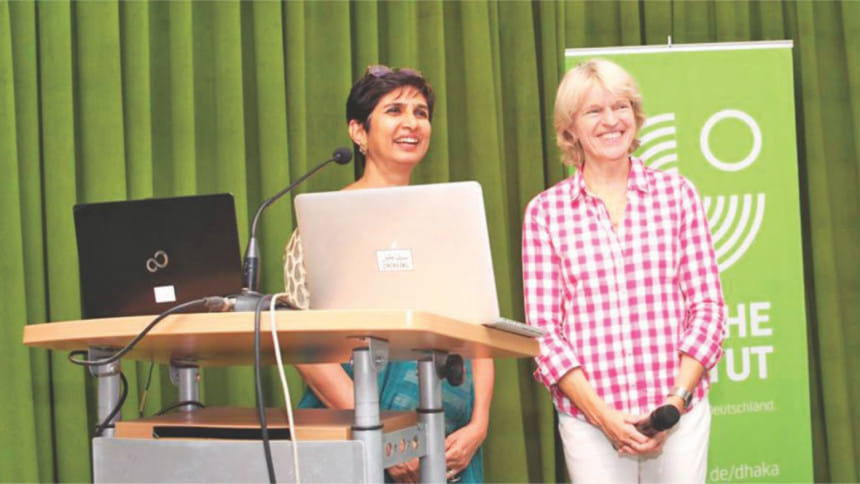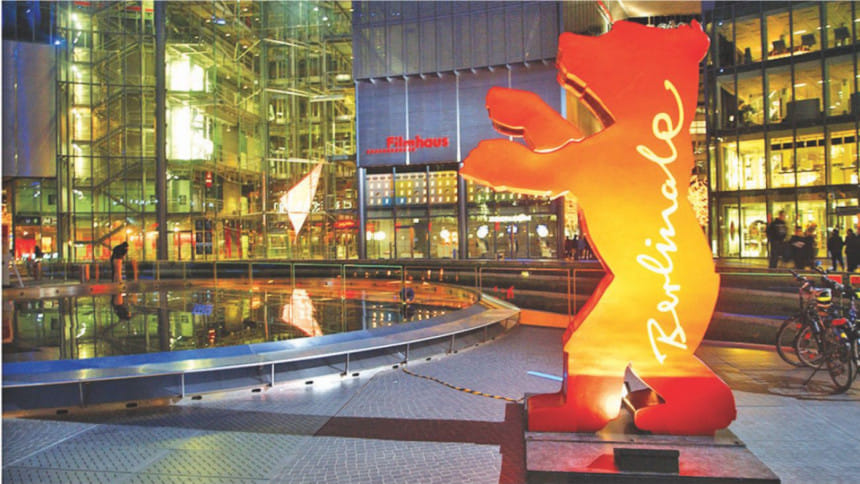Berlinale drops by Dhaka

In terms of ticket sales and admissions, it holds the bragging rights for the biggest annual film festival in the world, but the Berlin International Film Festival—or Berlinale, as it is better known as—is not just about its numbers. One of the major film festivals of Europe—and the world at large—has not really seen too many ripples being made from Bangladesh, but with efforts of documentary project market Dhaka DocLab and International Film Initiatives Bangladesh (IFIB), and a little help from Goethe Institut (GI) Dhaka, at least an avenue was created for exactly that.
Dorothee Wenner—a festival delegate from the programmer forum—and Meenakshi Shedde—festival consultant for India and South Asia at the festival were in Dhaka for the 'Berlinale Spotlight' over the first week of September, where they presented the programmes Berlinale has to offer for Bangladeshi filmmakers, producers and film critics, as well as some film screenings.
Along with Dr. Kirsten Hackenbroch, director of the Goethe Institut Bangladesh, the two Berlinale delegates sat down with The Daily Star to talk about their impressions of what the Spotlight looks to achieve, the Bangladeshi filmmaking community and more.
"The filmmaking community here is going through not such easy times and with not very easy infrastructure," Wenner says. "We won't be able to change greatly the situation you have in your country; you are responsible for that. But we have certain offers which partly fit together," she adds, about why the festival decided to have an event here.
"The Spotlight was designed by all of us so we at least sketch out all the opportunities," adds Hackenbroch, while admitting that the Goethe Institut has taken cinema as an issue of focus. "We felt like we haven't worked with film very much in last couple of years. We have film screenings, but we have not put together a project for the filmmaking community," she says, adding that with the support from Berlinale and other partners here, the German cultural centre is looking to invest in it.
The moment I booked the interview, I knew one of my questions would be about why there is so little representation of Bangladeshi cinema at major European festivals, and when I do, both festival programmers nod as if they were waiting for it. Shedde agrees that there is "so little to talk about" Bangladesh's history with the Berlinale, but Wenner offers an interesting counterpoint. "It's also one of the tricks of the trade to find the right festival for your film at the right moment. There is way more on offer than to say 'My goal is to get into competition of Cannes, Berlin, Venice'; there are a lot of things that can happen to a film made in Bangladesh." She however agrees that there is more happening in Bangladesh than what is visible from the European festival circuit. "We were quite impressed at the number of projects in the making, and let's hope that the presence of Bangladeshi cinema in our festival will increase. This is why we came here,"she says.

But it's not like Berlinale has been an impenetrable wall for Bangladeshi film talent. "When we were researching what Bangladesh's participation has been -- we found nine Bangladeshi filmmakers who have been part of Berlinale through various programmes. There's Kamar Ahmad Simon, there's Rubaiyat Hossain, there's Syeda Nigar Banu – there have been nine Bangladeshi participants – something the average person does not know – including two women!" says Shedde. "This is what we want people to know, that there are Bangladeshi filmmakers who have already made it there."
Although Bangladeshi films may not have been at the front and centre at Berlinale, the presence of Bangla films has been there for a long time. Satyjait Ray has had seven of his films at the festivals, winning two Silver Bear and one Golden Bear (for Ashani Sanket, 1973)—the highest prize of the festival. "Buddhadev Dasgupta has been in competition, and in sections like Panorama, and Forum—which is a more experimental space," says Shedde. More recently, 'cult' director from West Bengal 'Q' (Qaushiq Mukherjee)—whose film Gandu was at Berlinale, and this year he had Garbage at the festival. "Over the decades, but also across all sections—features, documentaries, shorts, experimental—there have been Bangla films, so we also wanted the community here to know that they can be there too," says Shedde.
Despite the optimism, it's not as simple. I ask if they have had films from Bangladesh in recent times that they liked, even if it didn't make the festival bill, and both of them affirm. "Yes, we have, and we really liked them, and fought for them," says Shedde.
"But we cannot give you the names, of course. Because the filmmakers share these films with us in confidence, and if I say a name you'll know that the film was rejected from the Berlinale," says Wenner.
"We have more than 40 programmers, and there are others programmers bringing films from Kazakhstan, from Finland and from Peru,"she adds. "Eventually we select about 400 films, and year by year, we are dealing with more and more submissions; that is the flipside of digital filmmaking. And as a filmmaker when you look at this number, you have to think, why am I adding another film to that? Am I producing for the shelf? That's also an important question. You don't want to become a filmmaker for the sake of being a filmmaker."
Bangladesh's independent (and even middle) cinema has been making its presence felt in the last few years, particularly across Asian festivals, and Europe seems like the next logical target. With the Berlinale Spotlight, a route map is at least taking shape, and that is a lot to look forward to for the Bangladeshi independent cinema community.

 For all latest news, follow The Daily Star's Google News channel.
For all latest news, follow The Daily Star's Google News channel. 



Comments